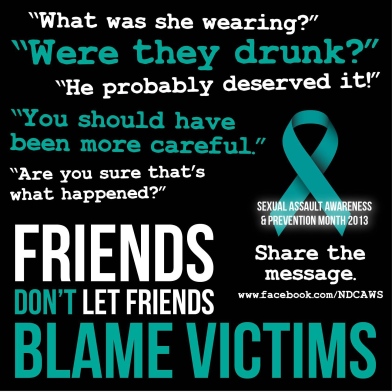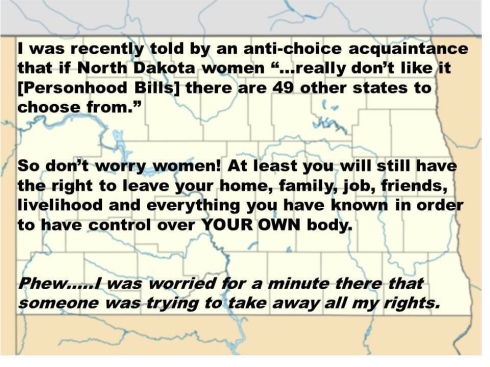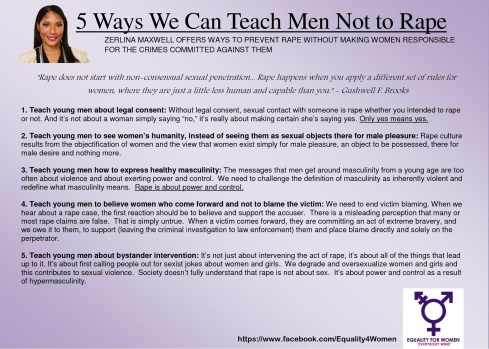*Trigger Warning: Sexual Violence* Take care of yourself. If you need to talk to someone, contact RAINN.
 This week, April 7-13, is International Anti-Street Harassment Week and April is both Sexual Assault Awareness Month and Abortion Wellbeing Month, an overlap that is very personal to me. I have been harassed on the street more times than I can count. I am a survivor of sexual assault, rape and childhood sexual abuse. I am also an abortion provider. Though these might not seem to have anything to do with each other, since my assaults thankfully did not result in pregnancy, they are intrinsically linked. Each assault I have endured and the violence I face as an abortion provider are affronts to my right to bodily autonomy. My tragedies, however, have shaped who I am as an individual: I am a warrior for equality.
This week, April 7-13, is International Anti-Street Harassment Week and April is both Sexual Assault Awareness Month and Abortion Wellbeing Month, an overlap that is very personal to me. I have been harassed on the street more times than I can count. I am a survivor of sexual assault, rape and childhood sexual abuse. I am also an abortion provider. Though these might not seem to have anything to do with each other, since my assaults thankfully did not result in pregnancy, they are intrinsically linked. Each assault I have endured and the violence I face as an abortion provider are affronts to my right to bodily autonomy. My tragedies, however, have shaped who I am as an individual: I am a warrior for equality.
 The restricting of access to abortion and sexual assault both serve one purpose–to control women by controlling their bodies. For women in the United States and around the world to be well, to be whole, equal and productive citizens women must first have the right to control their own bodies. The right to say no to unwanted physical contact and the right to make informed decisions about what medical procedures we choose to undergo are basic human rights. If I have sex and get pregnant and do not want to continue to be pregnant, I have the right to terminate the pregnancy because my body is mine alone and the responsibility for caring for the pregnancy would be mine alone. If I am a stranger, if I say no, if I stay silent, if I am crying, you have no right to my body. Consent is sexy and only an emphatic YES! means yes.
The restricting of access to abortion and sexual assault both serve one purpose–to control women by controlling their bodies. For women in the United States and around the world to be well, to be whole, equal and productive citizens women must first have the right to control their own bodies. The right to say no to unwanted physical contact and the right to make informed decisions about what medical procedures we choose to undergo are basic human rights. If I have sex and get pregnant and do not want to continue to be pregnant, I have the right to terminate the pregnancy because my body is mine alone and the responsibility for caring for the pregnancy would be mine alone. If I am a stranger, if I say no, if I stay silent, if I am crying, you have no right to my body. Consent is sexy and only an emphatic YES! means yes.
While hapless pundits wonder if violence against women is something that women really worry about, from Stubenville, Ohio to Delhi, India rape and sexual assault happen every moment of every day all around the world.

And each attack transforms its victim and its perpetrator. The healing process for survivors can be long and painful but so many initiatives now exist to put an end to sexual violence that the tides may be turning. Women in Kenya have filed a lawsuit against their government for failing to protect them from rape! From tackling street harassment with Meet Us On The Street and Hollaback! to a mom taking on Facebook‘s “controversial humor” pages glorifying sexual violence to Denim Day to the No More, Who Are You? and Where is Your Line? campaigns to comics and cell phone apps, more and more people are realizing that the strength of our numbers will ultimately win.
Unfortunately in the US abortion rights are backsliding.

While France has made contraception and abortion free for all women, here in the US we are still fighting for the right to buy prescriptions for birth control at our local pharmacies. North Dakota has banned abortion after 6 weeks, has only one abortion provider AND has a 72 hour waiting period. Ohio is working to make abortion illegal, as is Alabama. Iowa is trying to restrict abortion access for female inmates. Texas is seriously thinking about making it that much harder to get an abortion. Kansas lawmakers have been granted the right to lie to their patients and disrespect rape victims while making all abortion basically illegal. And Indiana, Virginia and North Carolina are in on this racket too. Sadly, recent news has shown us, as has history time and again, that without access to abortion women die. The United Nations has recently declared that denying abortions is tantamount to torture.
 Some states are defending Reproductive Justice; Oregon is considering a bill that would require Crisis Pregnancy Centers (non-medically licensed religiously affiliated centers that lie to women to prevent them from having abortions) to disclose what services they actually offer and comply with federal medical regulations regarding patient confidentiality. Also, Washington is trying to mandate insurance coverage for abortion care, and New York is attempting to broaden the availability of abortion. One recent victory for women in the US is the ruling that Emergency Contraception, also known as Plan B or The Morning After Pill, must be made available over-the-counter for all women. Health professionals and activists have been fighting for this for years and even though some states still oppose regular daily oral contraceptives, making EC more available will reduce abortion rates, which ultimately is everyone’s goal. And though Christian and Republican arguments against birth control and EC defy logic, it is a reasonable assumption that if everyone had access to comprehensive sex education and contraception that the rates of unintended pregnancy, and by default abortion, would be lower. The voice of reason now, our voices, must be heard if we want to see any change in this War on Women.
Some states are defending Reproductive Justice; Oregon is considering a bill that would require Crisis Pregnancy Centers (non-medically licensed religiously affiliated centers that lie to women to prevent them from having abortions) to disclose what services they actually offer and comply with federal medical regulations regarding patient confidentiality. Also, Washington is trying to mandate insurance coverage for abortion care, and New York is attempting to broaden the availability of abortion. One recent victory for women in the US is the ruling that Emergency Contraception, also known as Plan B or The Morning After Pill, must be made available over-the-counter for all women. Health professionals and activists have been fighting for this for years and even though some states still oppose regular daily oral contraceptives, making EC more available will reduce abortion rates, which ultimately is everyone’s goal. And though Christian and Republican arguments against birth control and EC defy logic, it is a reasonable assumption that if everyone had access to comprehensive sex education and contraception that the rates of unintended pregnancy, and by default abortion, would be lower. The voice of reason now, our voices, must be heard if we want to see any change in this War on Women.
 One courageous lawmaker this week, Assemblymember Lucy Flores (D-Nevada), disclosed to the public that she has had an abortion. Her compelling personal story of abortion being a positive life-changing experience for her comes at a time when most women would never dream of telling anyone they had an abortion. Though more than 1/3 of all American women will have an abortion at least once by age 45, a good 80% of my patients believe they don’t know anyone else who has had an abortion. The trepidation that women feel at disclosing this is both maddening and understandable: Flores has received death threats since admitting she does not regret having an abortion. This stifling of choice, and backlash against women who exercise their legal right to abortion, is one more spark igniting violence against women in the United States.
One courageous lawmaker this week, Assemblymember Lucy Flores (D-Nevada), disclosed to the public that she has had an abortion. Her compelling personal story of abortion being a positive life-changing experience for her comes at a time when most women would never dream of telling anyone they had an abortion. Though more than 1/3 of all American women will have an abortion at least once by age 45, a good 80% of my patients believe they don’t know anyone else who has had an abortion. The trepidation that women feel at disclosing this is both maddening and understandable: Flores has received death threats since admitting she does not regret having an abortion. This stifling of choice, and backlash against women who exercise their legal right to abortion, is one more spark igniting violence against women in the United States.
If we want equality, and I know some people don’t, we must respect women. We must respect women’s right to bodily autonomy. If women’s bodily autonomy were respected the rates of sexual assault would plummet, and women who have abortions would not be demonized for their choices. For Sexual Assault Awareness Month, share resources with your friends, be supportive of those who have been assaulted, speak out against rape jokes, and volunteer with or donate to your local rape crisis center. For Abortion Wellbeing Month, share your stories with your friends, be supportive of women or couples facing unwanted pregnancies, speak out against politicians interfering in medicine, and volunteer as an escort at your local clinic, or donate to your local abortion fund. Below are some tips on respecting bodily autonomy: what constitutes consent and how male allies can get in on the good fight and stop rape and street harassment. As always any comments, links, ideas and critiques are welcome as long as they are respectful and constructive. Carry on, dear reader, the fight for human rights needs you!
Related articles
- Recognizing Sexual Assault Awareness Month (whitehouse.gov)
- 10 Ways to Mark Sexual Assault Awareness Month (aauw.org)
- Abortion bill drops reporting provision (sfgate.com)
- One in Three: Silenced Stories of Survivors of Sexual Assault and Women Who Have Abortions (my.firedoglake.com)







